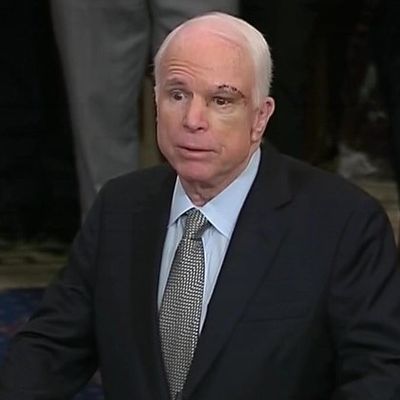
Shortly after news broke that John McCain would return to the Senate Tuesday — in time to vote on advancing his party’s heinous health-care bill — former Obama speechwriter Cody Keenan indulged a flight of fancy.
“What a remarkable moment it would be if a war hero, fighting cancer, returned to the Senate to say ‘this is wrong, America must be better,’” Keenan tweeted.
Twitter promptly declared Keenan a naif; an Aaron Sorkin–addled embodiment of every high-minded delusion that’s kept the Democrats out of power; a feckless centrist who had “huffed [his] own farts to the point where” he thinks “the West Wing is real.”
But on Tuesday, McCain proved that Keenan’s hypothetical was wholly realistic. And of course it was. Sure, the scenario sounded like a scene from a C-level Sorkin drama — but what politician comports himself as though he were auditioning for the role of Jed Bartlet more often than John Sidney McCain?
And so, earlier this afternoon, the cancer-stricken Arizona senator held forth on the floor of the upper chamber.
“We’ve tried to do this by coming up with a proposal behind closed doors in consultation with the administration, then springing it on skeptical members, trying to convince them it’s better than nothing, asking us to swallow our doubts and force it past a unified opposition,” McCain said, excoriating the extraordinary process that his colleagues had been using to pass sweeping changes to one-sixth of the American economy, with as little input from stakeholders and experts, as possible. “I don’t think that is going to work in the end. And it probably shouldn’t …Why don’t we try the old way of legislating in the Senate, the way our rules and customs encourage us to act?”
The sickly senator continued, through apparent physical discomfort, to argue that his party’s betrayal of legislative norms posed a threat to the very republic he’d spent his entire adult life trying to serve.
“What greater cause could we hope to serve than helping keep America the strong, aspiring, inspirational beacon of liberty and defender of the dignity of all human beings and their right to freedom and equal justice?” McCain asked, and was promptly met with raucous, bipartisan applause.
And it was a remarkable moment — uplifting, edifying, and, like every other Sorkinian drama, completely untethered from the reality of American politics.
Minutes before asking why his party wouldn’t “try the old way of legislating in the Senate,” McCain had cast the deciding vote on a motion enabling their current, historically abnormal process to continue.
Senate Republicans are trying to gut a half-century-old government program that provides health care to 70 million of America’s most vulnerable people — and they haven’t held a single hearing to assess the effects of their desired reforms.
They are moving forward with a bill to restructure the individual insurance market, even though the Senate parliamentarian just removed a core provision from their proposal — one that had been put in specifically because GOP legislators had concluded that without it, their bill could trigger a death spiral in the individual market.
And McCain had the power to stop them, single-handedly. By the time the senator arrived on Capitol Hill, senators Susan Collins and Lisa Murkowski had already voted no. McCain could have joined them. He could have used the political power that his constituents invested in him to demand an open, democratic process.
But then, McCain also could have retained his principled opposition to tax cuts on the wealthy, or high-minded support of action to combat climate change, or brave opposition to indefinite detention of suspected terrorists — even when doing so became politically difficult.
But he didn’t.
Instead, McCain abetted his party’s descent into radicalism, performed his courageous contrarianism, and then turned his attention to facilitating the expansion of the military-industrial complex.
As mavericks are wont to do.
It’s true that McCain’s words had some value. The senator put a spotlight on the outrageous legislative process that McConnell hopes the public will ignore. And he strongly implied that, while he supports open debate, he will oppose any bill that resembles the one Senate Republicans entered Tuesday with (whatever such a vow is worth).
John McCain has many admirable traits. He endured suffering to show solidarity to people he loved. He’s brought joy and mirth to many of his colleagues, friends, and family members. His illness is a tragedy. And he deserves our collective sympathy, and access to quality medical care, in his time of need.
But so does every American. And right now, his party is trying to pass a bill that would condemn thousands of them to preventable deaths. On Tuesday, he had the power to stop that from happening. He gave a fine speech instead.






























